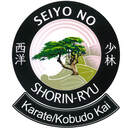|
Are you interested or committed to your martial art? There’s a big difference. "When you're interested in something, you will do it when it's convenient. When you're committed to something, you will do it no matter what." Those who are interested will practice their martial art when it’s convenient for them. If something more interesting is going on or they don’t feel like going to class that day, they don’t show up. They may even schedule appointments or other events at the same time as class. They often miss more classes then they attend in a month. They soon start to slip further and further behind in their training and will most-likely never achieve a 1st dan black belt or higher. Those who are committed to their art have a different attitude. They schedule class times and practice times on their calendar and see those time slots as non-negotiable. That’s THEIR time. No one else can take that time from them. They organize their life and schedules to be there, even if they aren’t 100% motivated that day, they know that showing up always makes them feel better. They know that being great at something is never convenient. It takes the three D’s… dedication, determination, discipline and desire. They don’t make excuses. They embody their craft. They make it known to their friends and family that their practice time is a core value that makes up who they are as a person. They don’t do it for the rank or the recognition, they do it because they ARE a martial artist, not someone who occasionally does a martial art. Are their times in which someone who is committed to their art misses a class or personal practice? Yes, but it’s rare. They might miss if they are extremely ill or have a major event (wedding, graduation, funeral, school/work function, religious event or the occasional vacation.) In some cases, work/school schedules might interfere with class times and the committed student might seek private lessons or contact their Sensei with questions on how best to practice on their own until their schedule changes. Making a commitment to something requires making sacrifices in your life that most people won’t do or understand. Commitment means living a life that most people will never achieve. "It's one thing to have a black belt in karate. It's another thing to BE one." *You can change the word “martial art” for anything you value and commit to in your life. Nourishing a great marriage, being a wonderful parent, having a healthy and fit body, building a successful business or achieving greatness in a field of study all take a level of great commitment.
0 Comments
Recently, an instructor from another karate dojo asked me a question. Here is what they said...
Question.
"I have a student going up for a black belt rank test who has physical limitations and health issues. There will be a lot of people there watching their rank test. I'm concerned about the test as the student is not physically able to perform certain techniques that are usually expected during a black belt test. Specifically, I'm concerned that if we make exceptions for this student to pass their test that other students would feel this isn't fair. Obviously, I want to be inclusive, but I also don't want others to see the rank test and form a negative opinion on what it takes to earn a black belt. How do you maintain high standards and still be inclusive to those with physical limitations? What would you do in this situation?"
Answer.
Here is my short answer: Set your standards high. However, be willing to modify when necessary.
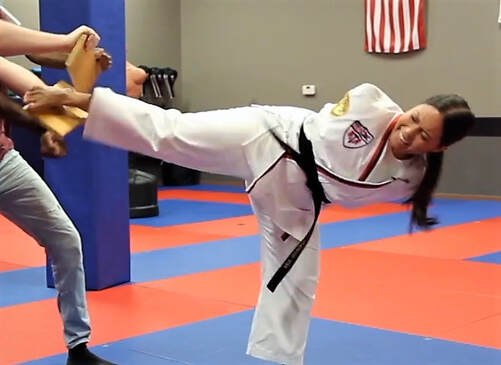 Life with Feet, CC BY 3.0 , via Wikimedia Commons Life with Feet, CC BY 3.0 , via Wikimedia Commons
Here's the longer answer: I have had students with total knee replacements, hip issues, heart issues and other physical challenges. Prior to testing, for those who have physical limitations, we teach modifications to specific techniques that will suit their bodies and physical abilities better.
The student MUST be able to defend themselves fully using the modified techniques. We also require the student to be able to verbalize the original way to perform the techniques, as listed in our system curriculum, even if they cannot do the technique themselves. They need to be able to teach others, without physical limitations, on how to do it properly. At the beginning of that student's rank test, I explain this to all those present. This way there is no misunderstanding. All of our other students have expressed understanding. We are a karate family and they know that every member is pushed and challenged in their own way. No one has ever expressed any unfairness.
Remember, everyone is on their own martial arts journey. Those who have limitations or disabilities should still be pushed to their highest personal ability. Understand, their greatest ability will not be as high as the students without any physical limitations. Do not make comparisons. Rather, seek to improve ALL who come through your doors to be the best they can possibly be. Seek out their strengths and reinforce them.
When rank testing a student, the questions to ask yourself as an instructor are:
​Need more inspiration? Take a look at the Adaptive Martial Arts Association or Karate Adaptation for Disabled People. You might also appreciate the video below for an example of some inspiring disabled karate athletes competing in an international karate tournament.
P.S. If you know of any other martial arts organizations that support karate for all physical capabilities, please comment below!
Kids are not naturally self-motivated. When your child’s mindset is not in the right place, even the most fun activities can be a struggle to get to. With that said, here are some strategies to help you work around lack of motivation when trying to get your kid to class.
1. Be attentive to what your child is doing at the moment he/she is supposed to get ready for class. If he/ she is playing or having fun with a friend, then be ready for a battle. With that said, have your child participate in a chore or task that’s not as much fun around 10 to 15-minutes prior to getting ready for class. 2. Be attentive to your own projection of emotions as you get your child ready for class. If you are stressed, rushed, or aggravated in any way, this will project the same emotions on your child. With that said, be sure to project positive and upbeat energy as you are getting your child ready for class. 3. Be attentive to how you respond to your child’s overall performance after class. If you are expressing too much emphasis on what he/ she did wrong versus right, then those negative feelings will carry over. With that said, be sure to limit criticism and focus more on productive conversations after class. 4. Be intentional with your goals by communicating with your child’s instructors. The goal is to foster motivation. Let the instructors know about your struggles so that they can be mindful to motivate your child before, during, and after class. It takes a village, so don’t be afraid to ask for support! 5. Prompt motivation by rewarding your child. Remember that children’s brains are still growing, and most of their development comes from positive stimulation and experiences. With that said, pre-frame the proper behavior that you would like to see when going to class, and then set an attainable number of classes he/ she must attend with this behavior, along with a reward for doing so. For example: attend the next 3 classes with the proper behavior and we will grab ice cream on the way home. These tips are not rocket science but are often overlooked. As parents, we get caught up in the daily grind, so we sometimes forget that situations like this require attentive and intentional parenting. I hope this article sheds some positive light on how to help your child get ready for class. Good luck! Click here for a downloadable and printable document of this article. A lot of myths surround the martial art of traditional Okinawan karate. Here are eight that you may have heard and the real truth.
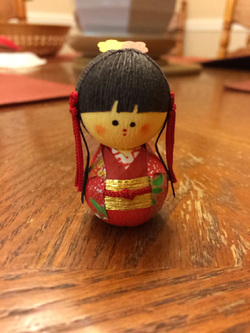 Recently, a gift of a tiny Geisha doll reminded me of something. She reminded me that when you fall down (or get knocked down) you get back up. And, you keep getting back up every time. It doesn't matter what challenges are thrown your way or what situation is occurring in your life at the time. You get back up. It doesn't matter if you are flat on your back at a low point in your life. You get back up. It doesn't matter if you are sick. You get back up. It doesn't matter if you weren't successful before or how many times you've tried and failed in the past. You get back up. It doesn't matter if you don't have anyone to lean on, pick you up, carry you or encourage you. You get back up. It doesn't matter if you've had your bell rung or your heart broken or your pride shattered. You get back up. You see, the world loves an underdog. The world wants to see you succeed. The world wants to see you get back up. Because it's the glorious grit of never quitting that emotionally charges the masses and inspires them. Then, when they fall down, and everyone does eventually... THEY GET BACK UP. ~ Vashon Borich, Sensei Like Branson Karate on Facebook Subscribe to this Blog! 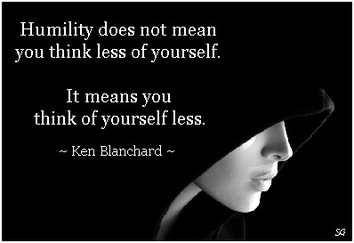 "There are many people out there who accomplish a little bit and decide that they are an expert. Humility is knowing what you don’t know." ~ Mark Manson (The Psychology of Life) In the martial arts world, I have noticed a trend with different practitioners and karate instructors. There appear to be two types of people, type A and B.
Type A, are the people who have a big mouth, who regularly talk about the things they have accomplished, they exaggerate their success and point out their trophies and belt ranks. Type A demands attention from those around them. They often dole out their sage wisdom to anyone and everyone who will listen. Then there is Type B, who downplay their successes or doesn't even mention them. Type B often admits when they don't know an answer, they aren't afraid to say when they make a mistake. They ask questions and learn from those in ranks below them and ahead of them. They regularly examine their own weaknesses and strive for constant improvement. They say very little, but demonstrate much through their actions. Although they may hold a very high rank in their primary martial art, they could be seen strapping on a white belt to learn a second, third or fourth martial art. The trend appears to be that the Type A's are only moderately successful in their martial arts. They may have had some accomplishments, but they had never achieved true master status or respect within the martial arts community. Where the Type B's are usually found to be legitimate masters in their art often with very high ranks. Not only were Type B's successful in their primary martial art, but in other arts as well. The Type B's had climbed to very peak of the martial arts community and achieved great respect from those around them. Taking on a type B attitude, pun intended as reference to the Beatitudes, is necessary for true success. This humility separates the wheat from the chaff. If you look through history and even the present, the greatest martial artists all have a humble spirit. Although many may not be widely known, they are at the top of their craft. They are male and female martial artists that have great knowledge, amazing levels of skill, true passion for their art and an ability to share their wisdom with others in ways that make their students passionate about the martial arts. Perhaps you don't have a deep desire to be a life-time martial artist. You can take these "Type B" traits and be a leader in any field, trade or industry. In summary, those traits are:
It's been a while since I last wrote. I've been involved in some introspective work and have been re-reading the Bubishi. If you are not familiar with the Bubishi, it is the classic manual of combat and was once considered a secret document passed down from master to student for centuries. The Bubishi is a classic Chinese work on philosophy, strategy, medicine and technique as they relate to the martial arts. It is sometimes referred to as the "bible of karate." There are several translations, the one I recommend is by Patrick McCarthy. One section that especially struck me was on the topic of balance. It goes on to state that "Perfect balance is a reflection of what is within." Balance can mean your physical capability to stand on one leg, for example. It can also mean the internal balance of your emotions and serene focus. In the Bubishi, physical and internal balance are one and the same. Balance is a requirement to be proficient in combat. If you have mastered balance, you are able to easily take advantage of or create a weakness in an opponent's posture. In the dojo we call this Kuzushi. Kuzushi is the Japanese term for unbalancing an opponent. It is the moment of weakness in which you can quickly overtake an opponent. The description that the Bubishi gives for the qualities contained in a balanced individual is poetic and beautiful... Like the sun's strength, your energy must radiate outward, your eyes should be as clear as the moon, and your legs should be like the rolling wheels of a cart. Your posture too, from head to toe, must be evenly balanced so that footwork and hand techniques support each other. If everything is in balance, no one will be able to defeat you. What I found most fascinating is that in order to have physical balance, you must first have internal balance. To cultivate internal balance one must grow in wisdom. The Bubishi lists nineteen laws of Wisdom. Here they are:
|
AuthorVashon Borich-Leach, Sensei teaches traditional karate and tai chi in Branson, Missouri. She considers herself a life-time student of the arts. Her blog is an open journal of lessons learned in the martial arts. If you are a martial artist and would like to contribute to her blog please contact her. Archives
May 2023
Categories
All
©2012 Branson Karate & Kobudo™
|
©2010-2024 Vashon Enterprises LLC, DBA Branson Karate™
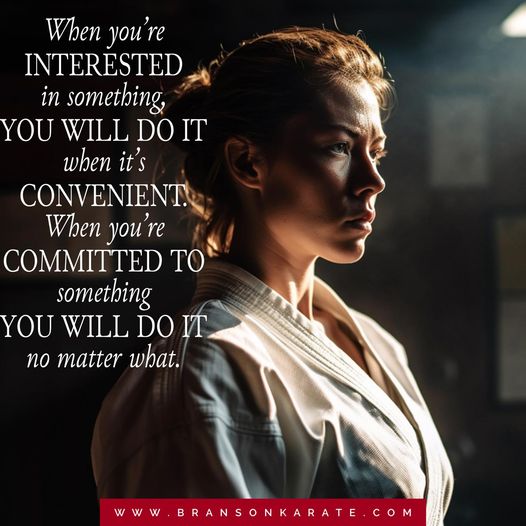
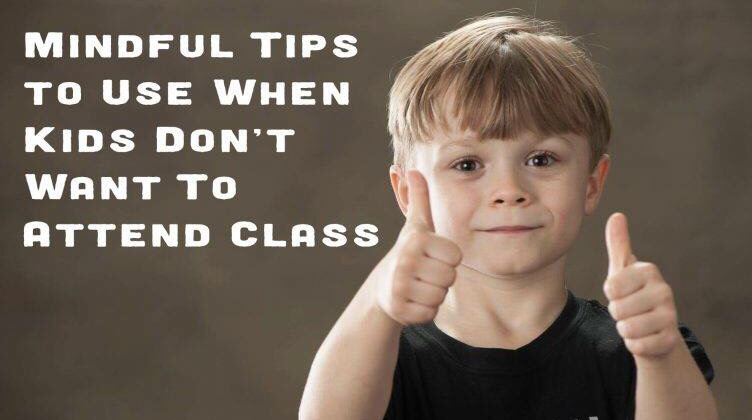
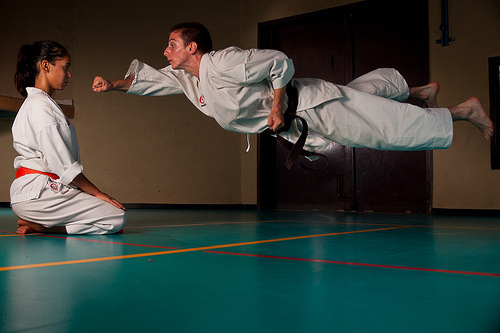
 RSS Feed
RSS Feed
